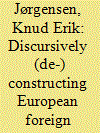| Srl | Item |
| 1 |
ID:
182619


|
|
|
|
|
| Summary/Abstract |
A theoretical gap in the audience cost theory is the missing analysis of its central feature: the audience. This article defines the audience as a group composed of individuals and societal actors that can punish a government and pay attention to the issue being negotiated. Thus, the audience can vary depending on the issue salience. When the issue salience is low, the audience comprises just interest groups and the attentive public. Yet, the higher the issue salience, the more voters of the general public also become part of the audience. The audience’s composition in turn determines the level of the audience costs. Because the general public tends to evaluate national honor more highly, be less informed and have less well-defined preferences than interest groups and the attentive public, the audience costs should be higher when the issue salience is high. Furthermore, the audience can take actions that prevent the effect of audience costs or generate exogenous audience costs.
|
|
|
|
|
|
|
|
|
|
|
|
|
|
|
|
| 2 |
ID:
142066


|
|
|
|
|
| Summary/Abstract |
This article is about European foreign policy, specifically an examination of ways in which discourse analysis and foreign policy analysis can be brought together. The first aim of this article is to explicate the explanandum in some detail. Before we know what we are looking for, it gives limited meaning to consider procedures for methodological procedures. Once the explanandum has been identified, the article examines theoretical approaches and critically discusses their promises and limitations. Priority is given to the option of applying constructivist discursive theories that might (or might not) have been developed with a view to analysing foreign policy, including European foreign policy. In doing so, the article aims at bridging several sometimes very different fields of study: discourse theory, which is sometimes utterly unaware of or uninterested in foreign affairs; and foreign policy analysis, which is frequently descriptive in orientation and at times characterized by less-than-benign neglect of discourse theory.
|
|
|
|
|
|
|
|
|
|
|
|
|
|
|
|